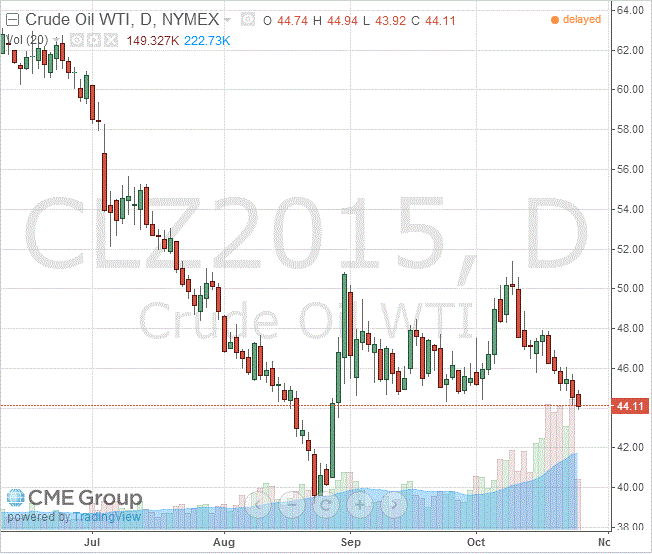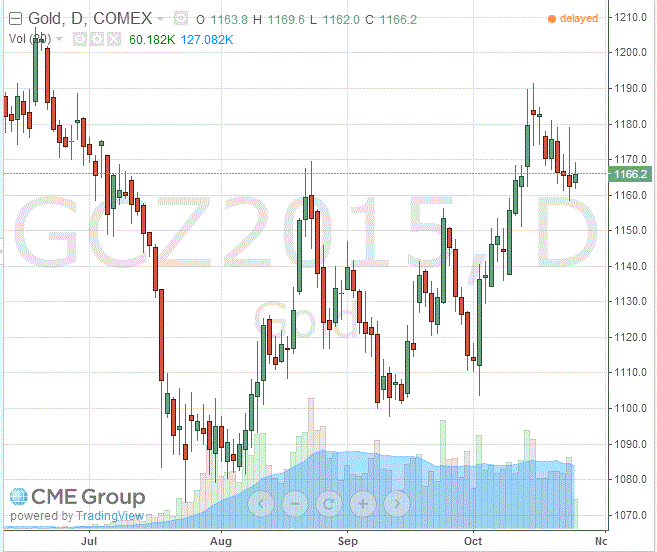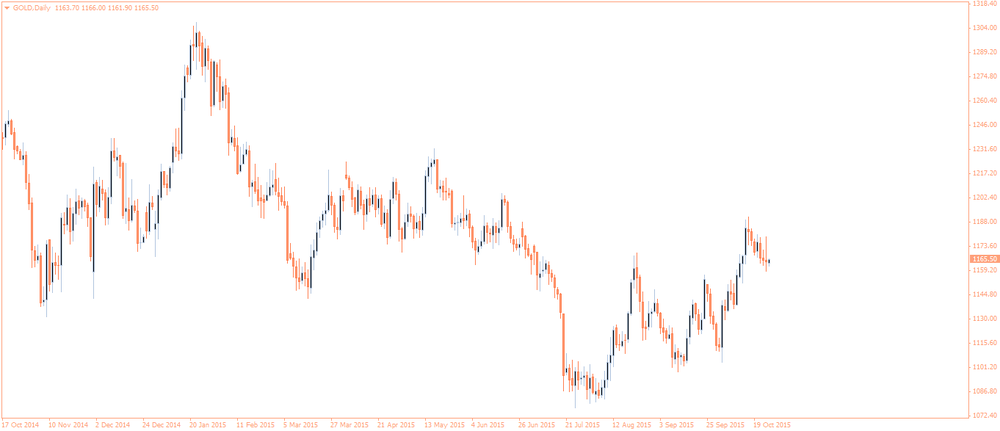Noticias del mercado
-
16:55
Oil prices decline on concerns over the global oil oversupply
Oil prices fell on concerns over the global oil oversupply. Goldman Sachs said on Monday that oil prices could fall further as storage capacities almost reached their maximum.
Market participants eyed comments by the International Energy Agency (IEA) Executive Director Fatih Birol. He said on Monday that oil prices could rise from mid-2016 on a lower investment in the oil industry.
"If it comes true, this will be the first time in two decades we will see oil investments declining for two consecutive years," he said.
Birol pointed out that oil investments already dropped by more than 20% in 2015.
WTI crude oil for December delivery declined to $44.11 a barrel on the New York Mercantile Exchange.
Brent crude oil for December fell to $47.84 a barrel on ICE Futures Europe.
-
16:42
Gold price climbs on a weaker U.S. dollar
Gold price rose on a weaker U.S. dollar. The greenback declined against other currencies on the weaker-than-expected U.S. new home sales data. The U.S. Commerce Department released new home sales data on Monday. New home sales dropped 11.5% to a seasonally adjusted annual rate of 468,000 units in September from 529,000 units in August. August's figure was revised down from 552,000 units. It was the highest figure since February 2008.
Analysts had expected new home sales to reach 550,000 units.
The decline was driven by lower sales in the Northeast. New home sales in the Northeast plunged 61.8% in September.
This data points to a cooling in the U.S. housing market.
Market participants were cautious ahead of the release of the Fed's monetary policy meeting results on Wednesday.
December futures for gold on the COMEX today increased to 1166.20 dollars per ounce.
-
10:27
International Monetary Fund: the slowdown in the Chinese economy could drag North Asia region into recession
The International Monetary Fund (IMF) said last week that the slowdown in the Chinese economy could drag North Asia region, which includes Japan, South Korea, Hong Kong and Taiwan, into recession. The lender expects the region to expand 5.5% this year. It is the weakest growth since the global financial crisis.
-
10:01
Reuters reports the International Monetary Fund will add the yuan to its basket of reserve currencies soon
Reuters reported on Sunday that the International Monetary Fund (IMF) officials said that the IMF will add the yuan to its basket of reserve currencies soon. The lender will decide in November.
"Everything is on course technically and there is no obvious political obstacle. The report leans clearly towards including the RMB in the (basket) but leaves the decision for the board," one IMF official said.
-
09:58
The number of active U.S. rigs falls by 1 rigs to 594 last week
The oil driller Baker Hughes reported on Friday that the number of active U.S. rigs declined by 1 rigs to 594 last week. It was the eighth consecutive decrease.
Combined oil and gas rigs remained unchanged at 787. It was the lowest level since April 2002.
-
08:03
Oil prices under pressure
West Texas Intermediate futures for December delivery climbed to $44.74 (+0.31%), while Brent crude slightly advanced to $48.09 (+0.21%). Nevertheless prices remained under pressure amid prospects of investment cuts.
Earlier this year Canadian Suncor Energy cut its 2015 capital spending by 1 billion Canadian dollars, or about US$837 million. French oil company Total cuts its 2017 daily output target to 2.6 million barrels from 8 million.
Fitah Birol, executive director of the International Energy Agency, said that oil-project investments are on track to decline for a second straight year in 2016 after a 20% fall in 2015.
-
07:46
Gold stabilized near a two-week low
Gold climbed to $1,165.30 (+0.21%) on Friday, but a relatively strong dollar and expectations for an imminent rate hike by the Federal Reserve kept bullion under pressure. Gains in stock markets, triggered by China's central bank's rate cut, also cut demand for this non-interest-bearing asset.
Most market participants don't expect the Fed to raise rates at this week's meeting, but they will be looking for signs of readiness to do so in December.
-
00:47
Commodities. Daily history for Sep Oct 23’2015:
(raw materials / closing price /% change)
Oil 44.61 +0.02%
Gold 1,162.70 -0.01%
-


